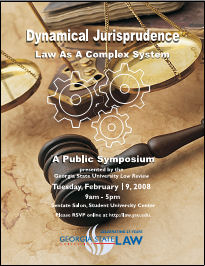Law Review Symposium February 19
January 23, 2008
Dynamical Jurisprudence: Law as a Complex SystemA Public Symposium presented by the Georgia State University Law Review
Tuesday, February 19. 2007 - 9:00 a.m.-5:00 p.m. - Register 
Senate Salon, Student University Center
44 Courtland Street, Atlanta, Georgia 30303 Map
About the Symposium
Until very recently, scientists believed that birds coordinated flocking behavior and ants coordinated hill construction behavior through some sort of leadership hierarchy. We now know that this is not the case; that these highly non-linear macro-level behaviors emerge from a large number of interconnected agents following very simple local rules of behavior. The explosion of multi-disciplinary research related to these complex systems has demonstrated that complexity is all around us—in human economies, in energy and telecommunication architectures, in social networks, and indeed in the human brain itself. In this symposium, Dynamical Jurisprudence: Law as a Complex System, we present an introduction to concepts of complexity science (assuming no previous knowledge of the field), raise the question whether law is a complex system, and investigate several substantive areas of the law where complex systems thinking has been applied. The promise may be that an understanding of complexity may prepare us to better design legal institutions to optimize social organization.
The morning session of the Symposium will include introductory remarks from Gregory Todd Jones, Faculty Research Fellow at the Georgia State University College of Law, Director of Research at the Interuniversity Consortium on Negotiation and Conflict Resolution, and founding Director of the Computational Laboratory for Complex Adaptive Systems. J.B. Ruhl, the Matthews & Hawkins Professor of Property at Florida State University College of Law and currently Visiting Professor of Law at Harvard Law School, will present a keynote introduction to complex systems fundamentals with illustrations from his own applications to environmental law. Two substantive application talks will follow: Gregory Todd Jones will discuss the implications of social network architecture for the design of social interventions and Daniel Katz and Derek Stafford from the University of Michigan's Department of Political Science and the Center for the Study of Complex Systems will use network analysis to examine judicial professional networks.
The afternoon will include four substantive application talks. Barbara Cherry, Professor in the Department of Telecommunications at Indiana University and former Senior Counsel for the Federal Communications Commission, will discuss the use of complexity theory to guide deregulatory policies in the telecommunication industry. Bernard Trujillo, Professor of Law at Valparaiso University School of Law will share some of his continuing empirical work involving complexity, self-organization, and bankruptcy. Scott Hughes, Professor of Law at the University of New Mexico will apply complex systems theory to conflict resolution. Ted Blumoff, Professor of Law and a ethicist at Mercer University School of Law will examine proximity within complex social networks as causative factors tied to omission accountability.
Douglas Yarn, Professor of Law at the Georgia State University College of Law and Executive Director at the Interuniversity Consortium on Negotiation and Conflict Resolution, will wrap up the day with a roundtable, including all of the speakers, that will investigate how complex systems ideas may be applied in practice. The Symposium will adjourn at 5:00.
Register to attend